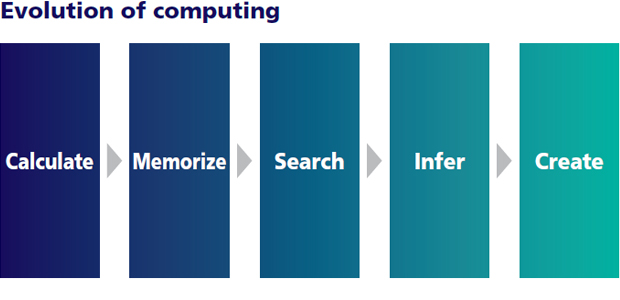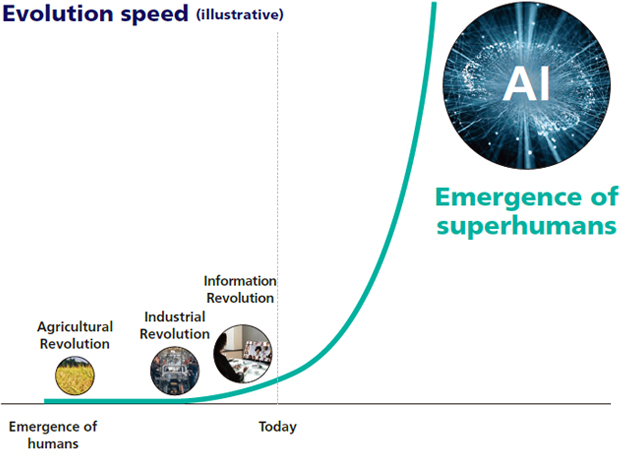Investor Relations
CEO Message—SoftBank Group Report 2023

An architect supporting the future of humanity
In autumn 2022, there was a moment when I started to wonder how many years I had left in my entrepreneurial journey. At times, these thoughts left me feeling somewhat empty. I realized that I did not want to spend the rest of my life as an entrepreneur carrying out tasks solely driven by a sense of obligation. When I asked myself what I most wanted to achieve, I came to re-realize my greatest ambition in life: to be an architect in support of the future of humanity. Even if I could play only a minor role in that capacity and if I stumbled along the way, I know this pursuit would still be the noblest and most exhilarating. From that day on, I have contemplated the future of humanity, and how we ensure that future generations do not face hardships and instead live in a prosperous society.
Back when I was a 19 year-old student in the U.S., I came up with nearly 250 inventions in a single year. During that period, the right side of my brain—the side that controls creativity—was remarkably active. In contrast, in the 42 years since I founded SBG, I have primarily relied on my left brain’s logical and analytical skills to manage the business. However, the turn of events in autumn 2022 reminded me of my life’s greatest ambition and reignited the right hemisphere of my brain. As a result, I have come up with approximately 630 inventions in the eight months since. Right now, I am working hard on inventions at the core of how artificial intelligence (AI) will impact the future of humanity. Often, an idea will come to me in my sleep, and I will jump out of bed, scribble it down in my inventions notebook, take a picture of the page, and send it to my team. At this rate, I could rack up a thousand ideas in a year. Sure, most of them will turn out to be duds. However, I firmly believe some of them will be real gems that could have a positive impact for future generations.
Last year, I passed on more of the day-to-day running of the company, including the quarterly earnings calls, to my management team led by our CFO. This was to dedicate more time to unlocking my creativity to focus on strategizing for the future, not just for the company, but for all of humanity. Right now, nothing on Earth is more intelligent than the human brain. However, that is poised to change. Within the next decade, we will reach Singularity, meaning that AI’s capabilities will surpass the collective intelligence of humans. We are determined to position ourselves at the forefront of this AI revolution—the Information Revolution. I believe this will ultimately lead to a substantial growth in our Group’s profits.
Beyond the boundaries of wisdom with GPT-4
In November 2022, OpenAI, led by Sam Altman, spectacularly debuted ChatGPT, a form of generative AI. In just its first two months, it attracted 100 million users worldwide. GPT-4 was released in March 2023, introducing multimodal capability. Unlike its predecessors, it processes multiple input simultaneously, including text, audio, image, and video inputs. While GPT-3.5 fell short of passing a college entrance exam, GPT-4 successfully passed the U.S. bar exam, with a grade roughly equivalent to the top 10% of applicants.
It is no wonder then, why we as a Group have been working to harness the power of generative AI. In May and June 2023, we held a competition open to employees across the Group, inviting them to come up with ideas for leveraging generative AI. The aim was to improve productivity, create new businesses, and address various social challenges. Over the course of a 10-day submission period, approximately 52,000 suggestions were collected. Following a pre-screening process, the top 11 ideas were presented to Dr. Yutaka Matsuo, a leading AI researcher and external director of SBG, and myself. We were delighted to find that many of the ideas exhibited excellence and some of them even had substantial business potential.
If you look at AI in the context of the history of computing, I believe that AI is about to take computing to its next evolutionary stage. Early computers were machines that could perform basic calculations. Computers then evolved into storage machines, capable of storing all kinds of information. The next phase saw computers become search engines, with people using Yahoo! and Google to swiftly search and retrieve this stored information. Now, with the advent of AI, computers have developed the ability to reason and infer. I myself challenge the limits of conventional wisdom every day in my interactions with GPT-4, and I feel that AI has limitless potential as an inferencing machine.
AI continues to evolve towards superintelligence
Computers will continue to evolve. In their next iteration, they will further enhance their capability to create. Many people think that the creative arts are the sole preserve of humans, but AI has already made inroads into this field. AI can now paint pictures, produce films, and create melodies and lyrics. It can even compose poetry and create stories.
The actions of learning, retaining, and retrieving information involve knowledge. By contrast, reasoning or creating something original is a matter of intelligence. While humans can never claim to reason or create based on limitless knowledge, AI can make this claim, and it will never stop evolving. The superior ability of AI over humans will be a matter of debate for only another few years. I expect AI intelligence to eventually reach at least 10,000 times the sum of human intelligence. I believe this scenario is only a few decades away. When that day comes, AI will become superintelligent, linking all social systems together. AI will also have begun to independently evolve and grow, continually designing and refining its own processing capabilities across an ever-broadening spectrum of use cases, such as robotics. It will reach an advanced level of intelligence and capabilities surpassing the limits of human comprehension.
This superintelligent AI could solve many of the intractable problems we could never hope to deal with ourselves. It could, for example, develop accident-free and comfortable transportation solutions, increase our healthy life expectancy, and bolster social resilience against natural disasters. Data from IoT devices, including thermometers, humidity meters, traffic lights, light bulbs, and sensors, will be analyzable by AI in real time, expediting the evolution of AI. With its integration into IoT devices, superintelligent AI has the potential to swiftly and accurately identify and warn of disasters, facilitating timely and secure evacuation alerts. This superintelligent AI will ensure that everyone’s basic needs like food, clothing, and shelter could be readily and affordably fulfilled, and will protect us from disease and disaster. It will soon be with us. Most of the 630 invention ideas I mentioned earlier were on this subject. An invention is something that has never existed before, something that no one has ever seen, heard, or felt. Inventions happen when you imagine something that does not yet exist and then give it shape. I believe that my inventions can help accelerate AI’s evolution and thereby pave the way for a more abundant and joyful world, with less suffering and greater happiness.
I am fully aware of the risks involved, of course. If abused, unconstrained AI could have devastating consequences. That is precisely why the world needs to discuss regulation to prevent such abuse, so that the right rules are in place. That said, it would be unfortunate if an excessive fear of risk were to lead to over-regulation. We should boldly facilitate progress in AI while making the necessary calibrations and adjustments. Through this evolutionary journey, we have the opportunity to imbue AI with the capability of reasoning. By doing so, we can ensure the safe operation of AI and its exclusive use for peaceful endeavors.
Arm has benefited from the growth in computing
Arm plays a crucial role at the very center of the evolution of AI. As of December 31, 2022, a total of 258 billion chips based on Arm technology had been shipped. The growth of Arm-based chip shipments has continued as Arm-based chips are used in all kinds of devices.
Following our acquisition of Arm in 2016, we doubled the number of its engineers. While the decision incurred significant upfront costs for Arm, it has proven to be highly rewarding as it drove a period of rapid growth. Since our acquisition, Arm not only has maintained an impressive leadership position in the smartphone chip market—but has also set its sight on broader horizons. With continuous advancements in CPUs and GPUs driving the computing landscape, we have witnessed Arm chips embedded in all kinds of devices, including a single integrated AI chip. I believe that Arm has continued room for growth in the years to come.
The SoftBank Vision Funds will also contribute to the evolution of AI. From the beginning, our investment decisions have prioritized AI, considering factors such as whether the prospective investments are AI-based or whether their application is the most suitable for leveraging AI. True, not all of these investments have been successful. However, within the nearly 500 portfolio companies, there are some very impressive companies where AI will play a crucial role in disrupting existing industries and creating new ones. We believe these companies will also play a central role in the evolution of AI and the future success of our Group.
Empowering happiness through the Information Revolution
AI—especially superintelligent AI—will undoubtedly be at the core of the Information Revolution. If you think of a computer as nothing more than a calculating, storing, and retrieving machine, then I encourage you to think again. Superintelligent AI will go beyond the realm of knowledge into the world of creative intelligence, helping us build a richer, happier, and brighter future.
As such, the time has come for our Group to go on the offensive. We could not be more ready. In fiscal 2022, we took a defensive stance by monetizing assets and massively curtailing investments. As a result, as of March 31, 2023, our cash position*1 topped ¥5 trillion, while our LTV*2 (loan-to-value: adjusted net interest-bearing debt divided by the equity value of investments) stood at 11%. In other words, we now have the solid financial footing we need to play offense. Fiscal 2023 will be critical. Weekdays and weekends, awake and asleep, my head is filled with ideas, sparking one action after another. It is thrilling. A few years ago, I thought about handing over to a successor. But in all honesty, I am enjoying the work so much that I am not yet willing to relinquish the reins. What is the Information Revolution about? It is a revolution to empower happiness for everyone. That is where I am devoting my efforts, and I sincerely hope I can rely on your continued support.
-
Cash and cash equivalents + short-term investments recorded as current assets + undrawn commitment lines. SBG stand-alone basis. Excludes SB Northstar
-
See page 21
for details.
July 2023
Masayoshi Son
Representative Director, Corporate Officer,
Chairman & CEO,
SoftBank Group Corp.
-
This page is based on the information as of July 27, 2023.
-
Click here to check the company names or abbreviations used in this page.

